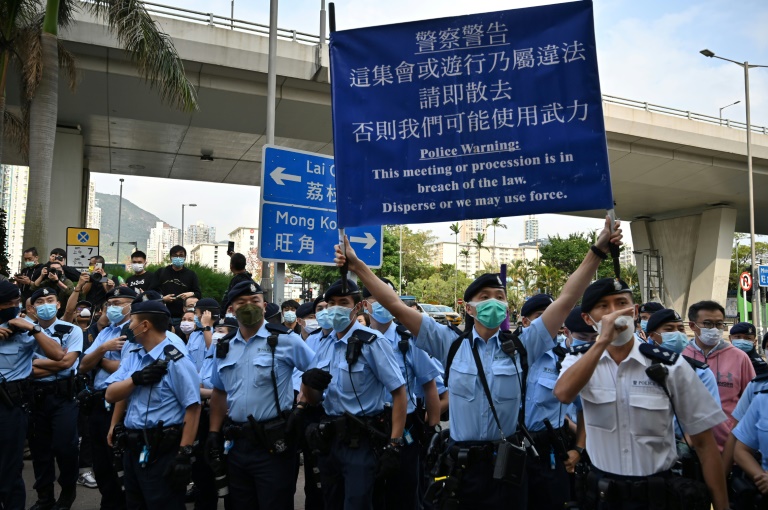China has moved to crush Hong Kong’s democracy movement after huge and violent protests rocked the finance hub two years ago, hammering the flickering freedoms and autonomy it promised the city would keep after British colonial rule ended in 1997.
The latest iteration of this crackdown is a ban on any rallies to commemorate Friday’s anniversary of Beijing’s deadly 1989 Tiananmen Square crackdown.
Here are some key developments over the past year.
– First confirmation of security law –
The first whispers of a new national security law for Hong Kong come in May 2020 when China’s top legislative body unveils plans to strengthen “enforcement mechanisms” in the city.
In a major departure from norms, Beijing announces that the law will not be debated and passed by Hong Kong’s legislature.
Instead it will be imposed by fiat, an unprecedented direct intervention by the central government.
The precise contents of the legislation are kept hidden from Hong Kong’s 7.5 million residents.
– Law passed –
China’s rubber-stamp legislature unanimously passes the security law on June 30 and it is immediately signed by President Xi Jinping.
The contents are published just one hour before it comes into effect that evening.
It outlaws anything China deems to be secession, subversion, terrorism or collusion with foreign forces.
Beijing says it will have jurisdiction over cases deemed to be serious breaches and introduces life sentences for the worst offences.
It also allows China’s security agents to operate openly in Hong Kong for the first time and outlaws peaceful political views such as pushing for independence or greater autonomy.
– First arrests –
The first arrests come a day later on the 23rd anniversary of Hong Kong’s return to Chinese rule, mainly for chanting or displaying now banned slogans.
A week later China’s security agents move into a requisitioned hotel which now serves as the force’s headquarters.
Other early arrests include four students for comments made on social media.
– Libraries, schools and media –
The security law is soon felt in newsrooms and campuses across Hong Kong.
Libraries and schools remove books written by democracy activists that could breach the new security law.
Two pro-democracy veterans are sacked by universities after they served jail terms for taking part in protests.
Major university leaders vocally embrace the new law.
In August, hundreds of police raid the newsroom of pro-democracy newspaper Apple Daily and arrest its owner, media tycoon Jimmy Lai.
Lai is eventually charged under the security law for allegedly campaigning for foreign sanctions and denied bail.
He is also jailed for attending multiple protests in 2019.
Public broadcaster RTHK becomes a target. A government mandated review accuses it of bias towards the democracy movement and a new head is appointed who begins vetting broadcasts for their content.
Multiple senior journalists quit.
RTHK journalist Bao Choy is convicted of making a false statement to obtaining vehicle licence plates for an investigation into whether police failed to stop a mob attack on protesters last year.
– Political disqualifications –
Hong Kong’s legislature is only half elected, but China begins a campaign to reduce that proportion even further, and vet anyone standing for office.
Soon after the security law takes effect, 12 democracy activists, including four sitting lawmakers, are disqualified from running in an upcoming legislative election because of their political views.
Another four serving pro-democracy lawmakers are then disqualified for their views in early November, sparking a mass walkout by the opposition that day.
– ‘Patriot’ laws –
In March Beijing’s rubber stamp parliament orders a major overhaul of Hong Kong’s political system.
Dubbed “Patriots rule Hong Kong”, it reduces the number of directly elected seats to less than a quarter and will freeze out most China critics by ensuring every candidate for public office must first be vetted by national security officers.
Hong Kong’s own opposition-devoid legislature approves the fast-tracked changes in late May.
New laws are also passed giving the government powers to sack public office holders and bar election candidates from standing if they are deemed “disloyal”.
– Mass arrests –
In the biggest national security operation yet, police charge 47 pro-democracy activists in March with subversion for organising an unofficial primary election.
Those arrested are some of the city’s most well-known activists, from labour leaders and rights lawyers to former legislators.
A mammoth four-day bail hearing ensues. The majority of defendants are remanded into custody under a provision in the security law that removes the presumption of bail for non-violent crimes.
The group face up to life in prison if convicted.











